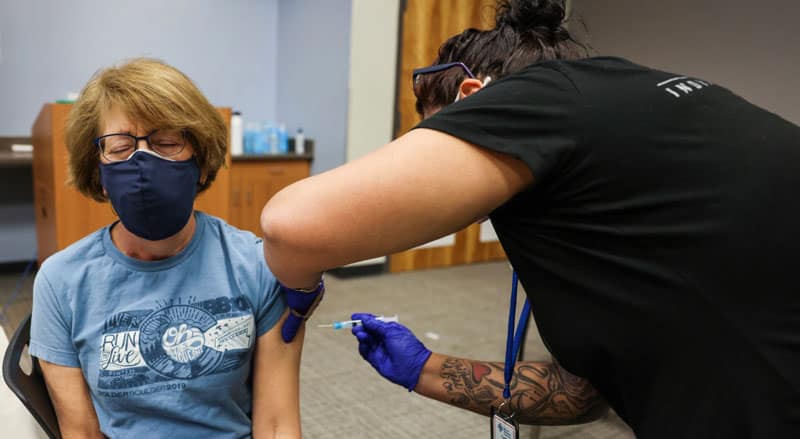U.S. Regulators at the Food and Drug Administration (FDA) have placed severe restrictions on Johnson & Johnson’s COVID-19 vaccine due to the risk of serious blood clots.
The FDA announced it has limited the use of the pharmaceutical giant’s one-shot vaccine after an investigation revealed that those who got the jab were at increased risk of developing potentially fatal blood clots.
The agency is now only authorizing J&J’s Janssen Covid vaccine to people 18 or older for whom other authorized or approved vaccines are not accessible or clinically appropriate.
The decision comes following an investigation into reports of thrombosis and thrombocytopenia syndrome (TTS) from those who have received the vaccine.
TTS is a rare and potentially life-threatening disease that creates blood clots and creates low levels of blood platelets.
There have been 60 confirmed cases, including nine fatalities, through March 18, 2022.
The alarm has been raised on the shot after 19 million doses have already been administered nationwide.
The FDA determined that the reporting rate of TTS is 3.23 per million doses of the vaccine administered, and the reporting rate of TTS deaths is 0.48 per million doses of vaccines administered.
Symptoms began in the confirmed cases about one to two weeks after the individual received the vaccine.
“We recognize that the Janssen COVID-19 vaccine still has a role in the current pandemic response in the United States and across the global community,” Peter Marks, the director of FDA’s Center for Biologic Evaluation and Research said in a statement.
“We’ve been closely monitoring the Janssen COVID-19 vaccine and occurrence of TTS following its administration and have used updated information from our safety surveillance systems to revise the [Emergency Use Authorization,” he continued.
“The agency will continue to monitor the safety of the Janssen COVID-19 vaccine and all other vaccines and, as has been the case throughout the pandemic, will thoroughly evaluate new safety information.”
J&J’s vaccine was initially considered an important tool in fighting the pandemic because it required only one shot.
But the single-dose option proved less effective than two doses of the Pfizer and Moderna vaccines.
In December, the Centers for Disease Control and Prevention recommended prioritizing Moderna and Pfizer vaccines because of the J&J shot’s safety issues.
Previously, U.S. officials had treated all three vaccines similarly because they’d each appeared to offer strong protection.
But follow-up studies have consistently shown lower effectiveness for J&J’s vaccine and officials say blood clots are still occurring.
The vaccine will now carry a starker warning about the potential “long-term and debilitating health consequences” of the side effect.
Under the new FDA instructions, J&J’s vaccine could still be given to people who had a severe allergic reaction to one of the other vaccines and can’t receive an additional dose.
J&J’s shot could also be an option for people who refuse to receive the mRNA vaccines from Pfizer and Moderna, and therefore would otherwise remain unvaccinated, the agency said.
A J&J spokesman said in a statement: “Data continue to support a favorable benefit-risk profile for the Johnson & Johnson COVID-19 vaccine in adults when compared with no vaccine.”
Despite the restriction, FDA’s vaccine chief Dr. Peter Marks said J&J’s vaccine “still has a role in the current pandemic response in the United States and across the global community.”
The FDA based its decision on “our safety surveillance systems and our commitment to ensuring that science and data guide our decisions.”
The clotting problems first came up last spring, with the J&J shot in the U.S. and with a similar vaccine made by AstraZeneca that is used in other countries.
At that time, U.S. regulators decided the benefits of J&J’s one-and-done vaccine outweighed what was considered a very rare risk — as long as recipients were warned.
The blood clots are believed to form because of a rogue immune reaction to the J&J and AstraZeneca vaccines because of how they’re made.
It forms in unusual places, such as veins that drain blood from the brain, and in patients who also develop abnormally low levels of the platelets that form clots.
Symptoms of the unusual clots include severe headaches a week or two after the J&J vaccination — not right away — as well as abdominal pain and nausea.
The New Brunswick, New Jersey-based company announced last month that it didn’t expect a profit from the vaccine this year and was suspending sales projections.
The rollout of the company’s vaccine was hurt by a series of troubles, including manufacturing problems at a Baltimore factory that forced J&J to import millions of doses from overseas.
Additionally, regulators added warnings about the blood clots and a rare neurological reaction called Guillain-Barré syndrome.

Our comment section is restricted to members of the Slay News community only.
To join, create a free account HERE.
If you are already a member, log in HERE.